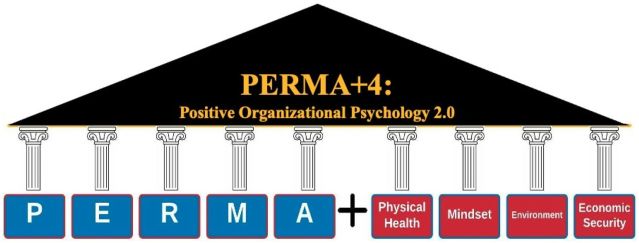Career
The PERMA+4 Framework: A New Approach to Well-Being at Work
The nine routes towards improving work-related well-being and performance.
Posted July 26, 2023 Reviewed by Lybi Ma
Key points
- Well-being is a function of positive emotions, engagement, relationships, meaning, and accomplishments
- PERMA+4 extends this to work via physical health, mindsets, work environment, and economic security.
- Assessing your PERMA+4 levels highlights areas that can be targeted for growth and development.
- Consistent small steps to boost the PERMA+4 elements can compound into sustainable gains at work.
Do you ever feel burned out, unfulfilled, or disengaged at work? You're not alone. Research suggests that we are in the midst of a burnout pandemic, where many employees struggle to cope with the imbalance between their extremely high job demands and limited access to available resources (Nadon and colleagues, 2022). This imbalance ultimately leads to stress, burnout, and disengagement at work, which can have lasting effects on our well-being, mental health, and performance. But new research shows there are science-backed ways to improve your work-related well-being and performance at work.
Stewart Donaldson, Scott Donaldson, and I recently published a paper reviewing the latest scientific evidence on the ways through which we can promote work-related well-being and performance. Our paper highlights the potential of the PERMA+4 framework to combat burnout and facilitate well-being. The PERMA+4 framework is an expanded version of Seligman’s popular PERMA model but optimised for the work context (2018).

What Is PERMA and What Does PERMA+4 Stand For?
According to Seligman, PERMA is an acronym that represents the five routes we can take to flourish in our general lives (2018).
- Positive Emotions. Experiencing pleasant feelings like enthusiasm and appreciation broadens thinking and builds resilience to challenges. Organizations can facilitate positive emotions through recognition programs, celebrations, and emphasizing a culture of gratitude.
- Engagement. Being highly absorbed, emersed, or experiencing flow while engaged in life's activities. When employees experience flow states where they lose track of time and become absorbed in projects, they are deeply engaged in their work. Companies can foster engagement by matching assignments to skills and interests.
- Positive Relationships. Having mutually beneficial connections and social support from colleagues satisfies the human need for belonging and brings out people's best. Organizations can nurture relationships through team projects, peer mentoring, and open communication.
- Meaning. Feeling connected to something larger than the self or serving a bigger purpose. Companies can cultivate meaning by connecting jobs to core values and community impact.
- Accomplishments. Experiencing a sense of mastery over a particular domain of interest or achieving important or challenging work-life goals. Organizations can enable accomplishments through career development and celebrating achievements.
Each of these elements independently contributes to general well-being but we know work brings its own unique challenges and opportunities. To optimize PERMA for the workplace, we suggest augmenting such with four additional components (hence the “+4”):
- Physical Health. Having a combination of high levels of biological, functional, and psychological health assets. Quality sleep, nutrition, activity levels, and energy can majorly affect our focus, personal drive, and resilience. Organizations can promote employee health through wellness activities, workplace policies, and designing ergonomic work environments.
- Growth Mindset. The belief that abilities grow with effort, fuels motivation and perseverance. Companies can foster growth mindsets through training and emphasizing effort over innate talent.
- Work Environment. Elements like lighting, air quality, safety, lack of distractions, and access to nature in the physical workspace affect performance. Companies can optimize environments through flexible, ergonomic workspaces.
- Economic Security. A baseline of financial stability enables employees to focus at work without money fears. Organizations can promote security through fair pay, retirement contributions, and financial wellness programs.
Together, the nine elements of the PERMA+4 framework provide mutually reinforcing nutrients to nourish work-related well-being and individual flourishing. Research shows that employees who thrive across the PERMA+4 domains also experience higher levels of engagement, motivation, resilience, grit, organisational citizenship behaviours, and performance.
How Can You Harness the Power of PERMA+4?
Take the Positive Functioning at Work Assessment to gauge where you stand on each of the nine building blocks. The test is found in the original article and only takes about five minutes. This will help you identify the priority areas you need to focus on. Look at lower-scoring areas as opportunities for growth. Take small steps to cultivate these elements. Even minor tweaks can gradually compound into real and sustainable change. Here are some practical, evidence-based practices you can use to cultivate the different elements:
Positive Emotions
- Start a gratitude journal and write down things you appreciate at work each day.
- Make it a habit to recognize colleagues' contributions and achievements.
- Celebrate milestones and progress towards your goals.
Engagement
- Block time in your calendar for deeply focused work.
- Take on tasks where you can use your strengths.
Relationships
- Schedule one-on-ones and coffee chats to get to know colleagues.
- Join work social events and meetings even when not mandatory.
- Collaborate on projects to build trust and rapport with teammates.
Meaning
- Reflect on how your work contributes to customers or society.
- Act as a mentor for a new or younger colleague.
Accomplishments
- Break large goals down into smaller milestones to gauge progress.
- Take on new challenges and projects that spark curiosity.
- Develop new skills through training, classes, or mentoring.
Physical Health
- Take walking meetings and breaks throughout the workday.
- Establish healthy sleep routines to recover and recharge.
- Pack nutritious snacks and lunch to fuel your day.
Mindset
- Read books and articles on developing a growth mindset.
- View setbacks as learning opportunities
- Recognize when your inner critic is holding you back
Work Environment
- Personalize your workspace with plants, photos, and natural light.
- Use noise-canceling headphones to reduce distractions.
- Adjust your chair, monitor, keyboard, and lighting for better ergonomics.
Economic Security
- Build emergency savings and retirement contributions.
- Review your budget to reduce unnecessary expenses.
- Negotiate fair compensation and pay raises when possible.
With consistent and deliberate practice, the PERMA+4 framework offers a customizable roadmap to help you flourish and perform better at work. The bottom line? Don't settle for merely surviving another ho-hum nine-to-five. Take action so you can truly thrive at work. Your future happy, high-performing self will thank you.
References
Donaldson, S. I., Van Zyl, L. E., & Donaldson, S. I. (2021). PERMA+4: A framework for work-related wellbeing, performance and positive organisational psychology 2.0. Frontiers in Psychology, 12(817244).
Nadon, L., De Beer, L. T., & Morin, A. J. (2022). Should burnout be conceptualized as a mental disorder? Behavioral Sciences, 12(3), 82.
Seligman, M. (2018). PERMA and the building blocks of well-being. The Journal of Positive Psychology, 13(4), 333-335.




